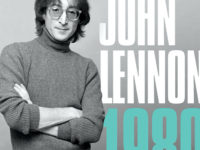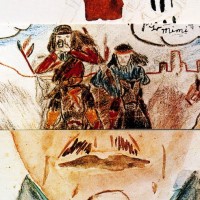John Lennon’s biting “I Don’t Wanna Face It” begins with the smeared sound of a tape machine engaging — this powerful reminder that Milk and Honey includes the incomplete, posthumous recordings a murdered genius.
Even so, you’ll find that all of the parts are still there, though they are scattered about, in this half-chiseled monument to creative rebirth for Lennon: He works in antithesis, throws away a bit of ageless wisdom, acts a little silly. All inside of “I Don’t Wanna Face It.”
Most remember the hit single “Nobody Told Me” from Milk and Honey — with its familiar, call-and-response “there’s always something happening, but nothing going on … everybody’s smoking but no one’s getting high.” No surprise, really, that a song that so strongly recalled the sharp wit and word-play whimsy of John Lennon’s late-Beatles period shot into the Top 20. Elsewhere on Milk and Honey, released by Capitol on January 27, 1984, there remained the now-familiar shared sequencing with Yoko Ono, who would complete this project alone, and a devastating demo of Lennon’s “Grow Old Along With Me” that made clear just what she’d lost.
But “I Don’t Wanna Face It” remains its peak. From the first, this is prototypical John Lennon, beginning with an intro that is this dazzling absurdity, Lennon at his wackadoo best: He counts off, in made-up gibberish melding Old World-sounding language with a drunken Lewis Carroll: “Un, deux, eins-zwei-hickel-pickel!”
A grinding guitar follows and, despite that jokey turn to start, ample evidence that Lennon’s illuminatingly personal lyricism was still in tact, despite five years away as a househusband: “You’re looking for some peace and love, a leader of a big old band; you want to save humanity, but it’s people that you just can’t stand.”
That very disassociative, brutally honest, toss-off attitude — found in this far-looser follow up to Double Fantasy in general, and “I Don’t Wanna Face It” in particular — has ultimately made it more memorably in keeping with Lennon’s uneven solo career, to me, than did its sometimes too-slick predessor from four years before.
John Lennon always had the ability to raise our sights, while frustrating our desires — and his time away from the Beatles was poorer selling for it. He was brilliantly incisive (Plastic Ono Band) and sometimes too stringent (Sometime in New York City), bravely utopian (Imagine) and recklessly self-indulgent (Walls and Bridges) and, it’s no surprise, the last of the Fabs to score a No. 1 hit.
Even here, the song’s ending is transitional; “I Don’t Wanna Face It” probably needed one more take. That works, too, in its way: This is another searing reminder of the fate that lay just around the corner for John Lennon on a New York City street. In the meantime, he rocked a little. We’re richer for this moment, only half varnished, unrepentant and very real. I really don’t think Lennon, who once put out a series of albums called Unfinished Music, would have had it any other way.
- Nick DeRiso’s Best of 2015 (Rock + Pop): Death Cab for Cutie, Joe Jackson, Toto + Others - January 18, 2016
- Nick DeRiso’s Best of 2015 (Blues, Jazz + R&B): Boz Scaggs, Gavin Harrison, Alabama Shakes - January 10, 2016
- Nick DeRiso’s Best of 2015 (Reissues + Live): John Oates, Led Zeppelin, Yes, Faces + others - January 7, 2016




